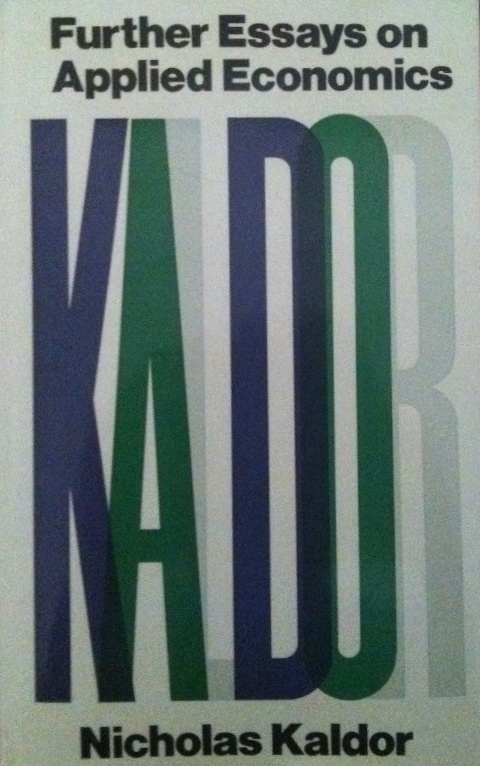… Some day the nations of Europe may be ready to merge their national identities and create a new European Union – the United States of Europe. If and when they do, a European Government will take over all the functions which the Federal government now provides in the U.S., or in Canada or Australia. This will involve the creation of a “full economic and monetary union”. But it is a dangerous error to believe that monetary and economic union can precede a political union or that it will act (in the words of the Werner report) “as a leaven for the evolvement of a political union which in the long run it will in any case be unable to do without”. For if the creation of a monetary union and Community control over national budgets generates pressures which lead to a breakdown of the whole system it will prevent the development of a political union, not promote it.
[italics in original]
That was written in 1971! In The Dynamic Effects Of The Common Market first published in the New Statesman, 12 March 1971 and also reprinted (as Chapter 12, pp 187-220) in Further Essays On Applied Economics – volume 6 of the Collected Economic Essays series of Nicholas Kaldor.
Further excerpts from the article:
Page 202:
The events of the last few years – necessitating a revaluation of the German mark and a devaluation of the French franc – have demonstrated that the Community is not viable with its present degree of economic integration. The system presupposes full currency convertibility and fixed exchange rates among the members, whilst leaving monetary and fiscal policy to the discretion of the individual member countries. Under this system, as events have shown, some countries will tend to acquire increasing (and unwanted surpluses) in their trade with other members, whist others face increasing deficits. This has two unwelcome effects. It transmits inflationary pressures emanating from some members to other members; and it causes the surplus countries to provide automatic finance on an increasing scale to the deficit countries.
Page 205:
… This is another way of saying that the objective of a full monetary and economic union is unattainable without a political union; and the latter pre-supposes fiscal integration, and not just fiscal harmonisation. It requires the creation of a Community Government and Parliament which takes over the responsibility for at least the major part of the expenditure now provided by national governments and finances it by taxes raised at uniform rates throughout the Community. With an integrated system of this kind, the prosperous areas automatically subside the poorer areas; and the areas whose exports are declining obtain automatic relief by paying in less, and receiving more, from the central Exchequer. The cumulative tendencies to progress and decline are thus held in check by a “built-in” fiscal stabiliser which makes the “surplus” areas provide automatic fiscal aid to the “deficit” areas.
[italics in original]
Page 206:
…What the Report fails to recognize is that the very existence of a central system of taxation and expenditure is a far more powerful instrument for dispensing “regional aid” than anything that special “financial intervention” to development areas is capable of providing.
The Community’s present plan on the other hand is like the house which “divided against itself cannot stand”. Monetary union and Community control over budgets will prevent a member country from pursuing full employment policies on its own- from taking steps to offset any sharp decline in the level of its production and employment, but without the benefit of a strong Community government which would shield its inhabitants from its worst consequences.
page 192:
Myrdal coined the phrase of “circular and cumulative causation” to explain why the pace of economic development of the various areas of the world does not tend to a state of even balance, but on the contrary, tends to crystallise in a limited number of fast-growing areas whose success has an inhibiting effect on the development of others. This tendency could not operate if changes in money wages were always such as to offset difference in the rates of productivity increase. This, however is not the case; for reasons that are not perhaps fully understood, the dispersion in the growth of money wages as between different industrial areas tends always to be considerably smaller than the dispersion in productivity movements. It is for this reason that within a common currency area, or under a system of convertible currencies with fixed exchange rates, relatively fast-growing areas tend to acquire a cumulative competitive advantage over relatively slow growing areas. “Efficiency wages” (money wages divided by productivity) will, in the natural course of events, tend to fall in the former, relatively to the latter – even when they tend to rise in both areas in absolute terms. Just because the differences in productivity increases, the comparative costs of production in fast-growing areas tend to fall in time relatively to those in slow-growing areas and thus enhance their competitive advantage over the latter.
I don’t have the copyrights to reproduce the whole article The Dynamic Effects Of The Common Market, so this is so much I can quote. You can read the rest from the book (Collected Essays 6). Also, there are five chapters on the Common Market.
